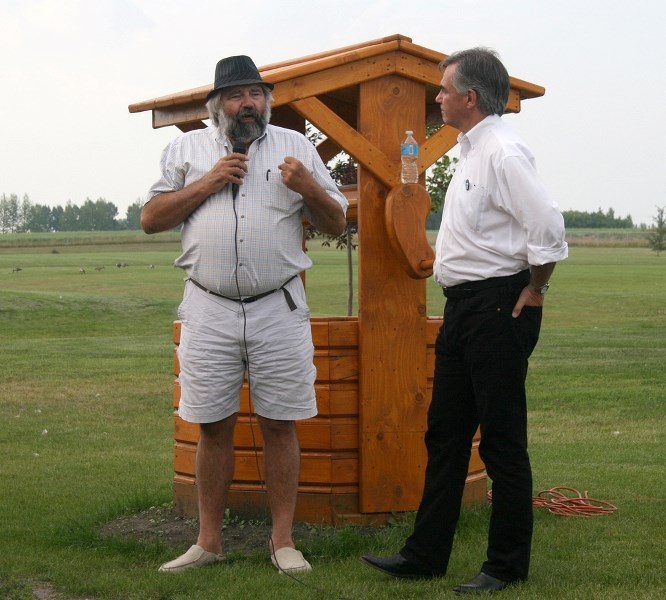Progressive Conservative leadership hopeful Jim Prentice made a pit stop in St. Paul on Aug. 1, to talk to supporters and local residents about his vision and goals for the ruling party that has found itself mired in scandal.
“I’m an outsider who is upset and disappointed by what I’ve seen. The question is, who is going to do something about it, and I intend to,” he said in an interview following a speech to a crowd gathered at Reunion Station.
As someone who has not been part of the provincial government, he said he had issues with entitlement and bureaucracy in the party.
“I’m running to be the leader of this party, and if successful, one of my priorities is to stop the kind of conduct the PCs are getting criticized for, and restore a sense of trust between Albertans and their government.”
Prentice described his past to the audience, and spoke about how he grew up in Alberta in a blue-collar family that he said valued hard work and education.
Prentice, who became a lawyer, found his way to Parliament Hill, and as a MP held portfolios in Environment, Industry and Indian Affairs and Northern Development. After leaving work as a politician, he joined the private sector, but said the political climate of Alberta made him want to return to the job.
During his speech, Prentice acknowledged a widespread discontent with the governance of the province.
“The Alberta I fell in love with is a place where we have strong people, we’re passionate for free enterprisers, we believe in strong communities . . . taking care of people who are less fortunate than ourselves,” he said.
He maintained that while the party is still popular, people want to see it improve, and “get back on track.”
Prentice outlined his agenda, which includes a fiscally conservative approach to financial matters, balancing the budget, moving toward a surplus, and the restoration of public trust in the government.
An area of particular focus is the maximization of Alberta’s natural resources and pushing to enter a broader global marketplace.
“Your oil was selling for 60 cents on the dollar, with the consequence in our province that our finances collapsed. This isn’t good enough, folks. We’ve got to get these pipelines built to the west coast,” he said.
“If we strike a partnership with the government and First Nations of B.C., we will have prosperity as far as the eye can see, and if we don’t, our finances are going to collapse again in about 2019.”
Another area of focus in Prentice’s agenda include establishment of higher environmental protection standards.
He noted that healthcare, education, and skills training, and infrastructure are all areas that need work and funding.
Ray Danyluk, a former PC MLA for the riding, said a few words on what he believes the area needs in a premier.
“(This) constituency is probably one of the most diversified in Alberta…This area is about community and it's one thing that's very necessary, that we need leadership…from a premier who understands, that's not afraid to speak out,” said Danyluk.
“We work very, very hard to support Alberta. Yet at the same time, one of our main challenges we have is municipally. In this area there's no such thing as a pipeline. Every litre of oil is trucked…on the roads of the municipalities without any compensation. Municipalities need to be supported with bridges, roads and highways."
One guest asked, “The last two premiers of the province have not fared so well. Why do you want to throw your hat in for this?”
Prentice replied saying, “I’m an optimist. The last premier had some challenges, but it’s about leadership. It’s about what lies ahead for this province.” He added, “We’re at a critical moment in the province’s history. If we let things get worse, we’re going to have a province in the ditch. I don’t feel alone in this, I think a lot of people feel the same way.”
Ernest Houle, a former chief of Whitefish (Goodfish) Lake, voiced his support for Prentice’s push for expansion of Canada’s petroleum market, citing a three per cent unemployment rate at Cold Lake First Nations.
“These young people are taking initiative. We bring lots to the table. Enbridge relies on aboriginal people in Cold Lake to come and help. This province has aboriginal doctors, lawyers, and chiefs.”
Prentice agreed, saying, “When things got really tough for pipeline companies trying to deal with these issues to the west coast and build pipelines, who do they call? They call the First Nations of Alberta . . . to help us strike First Nations Partnerships in B.C.”
County of St. Paul CAO Sheila Kitz asked Prentice about his views on municipal grants such as the Resource Road program, and Municipal Sustainability Initiative (MSI) funding.
Prentice responded to Kitz, saying, “It doesn’t make sense to me that we have a system where the industrial part of the province is destroying the roads of rural Alberta, and we’re leaving the cost of maintaining those roads on taxpayers and municipalities.”
He said there should be a better balancing of costs, citing the $50 million the County of Grande Prairie pays to maintain its roads.
“I’m sympathetic to what I hear across rural Alberta. There’s not a fair share of revenue and responsibility. We’re all in this together; we’re only going to have a strong province with strong rural communities,” said Prentice.



